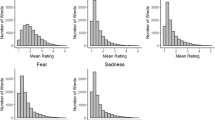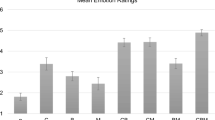Abstract
Emotion norms shape the pursuit, regulation, and experience of emotions, yet much about their nature remains unknown. Like other types of social norms, emotion norms reflect intersubjective consensus, vary in both content and strength, and benefit the well-being of people who adhere to them. However, we propose that emotion norms may also be a unique type of social norm. First, whereas social norms typically target behaviors, emotion norms can target both expressive behavior and subjective states. Second, whereas it may be possible to identify universally held social norms, norms for emotions may lack any universality. Finally, whereas social norms are typically stronger in more collectivist cultures, emotion norms appear to be stronger in more individualist cultures. For each of the potentially distinct features of emotion norms suggested above, we highlight new directions for future research.
Similar content being viewed by others
Data Availability
Not applicable.
Change history
24 May 2023
The title of the article is repeated as a heading above the first paragraph.
Notes
Some exceptions might exist, such as the norm for moderate consumption of alcohol in some cultures (Hanson, 1995), to the exclusion of both abstinence and binge-drinking.
References
Allen, J. A., Diefendorff, J. M., & Ma, Y. (2014). Differences in emotional labor across cultures: A comparison of Chinese and U.S. service workers. Journal of Business and Psychology, 29(1), 21–35. https://doi.org/10.1007/s10869-013-9288-7
Bastian, B., Kuppens, P., Hornsey, M. J., Park, J., Koval, P., & Uchida, Y. (2012). Feeling bad about being sad: The role of social expectancies in amplifying negative mood. Emotion, 12(1), 69–80. https://doi.org/10.1037/a0024755
Bastian, B., Kuppens, P., De Roover, K., & Diener, E. (2014). Is valuing positive emotion associated with life satisfaction? Emotion, 14(4), 639–645. https://doi.org/10.1037/a0036466
Bicchieri, C. (2006). The grammar of society: The nature and dynamics of social norms. Cambridge University Press.
Bond, R., & Smith, P. B. (1996). Culture and conformity: A meta-analysis of studies using Asch’s (1952b, 1956) line judgment task. Psychological Bulletin, 119(1), 111–137. https://doi.org/10.1037/0033-2909.119.1.111
Briggs, J. L. (1970). Never in anger: Portrait of an Eskimo family. Harvard University Press.
Chentsova-Dutton, Y. E., Senft, N., & Ryder, A. G. (2014). Listening to negative emotions: How culture constrains what we hear. In W. G. Parrott (Ed.), The positive side of negative emotions (pp. 146–178). Guilford Press.
Cialdini, R. B., Reno, R. R., & Kallgren, C. A. (1990). A focus theory of normative conduct: Recycling the concept of norms to reduce littering in public places. Journal of Personality & Social Psychology, 58(6), 1015–1026. https://doi.org/10.1037/0022-3514.58.6.1015
De Leersnyder, J. (2017). Emotional acculturation: A first review. Current Opinion in Psychology, 17, 67–73. https://doi.org/10.1016/j.copsyc.2017.06.007
De Leersnyder, J., Mesquita, B., & Kim, H. S. (2011). Where do my emotions belong? A study of immigrants’ emotional acculturation. Personality and Social Psychology Bulletin, 37(4), 451–463. https://doi.org/10.1177/0146167211399103
Eid, M., & Diener, E. (2001). Norms for experiencing emotions in different cultures: Inter- and intranational differences. Journal of Personality and Social Psychology, 81(5), 869–885. https://doi.org/10.1037//0022-3514.81.5.869
Eriksson, K., Strimling, P., Gelfand, M., Wu, J., Abernathy, J., Akotia, C. S., Aldashev, A., Andersson, P. A., Andrighetto, G., Anum, A., Arikan, G., Aycan, Z., Bagherian, F., Barrera, D., Basnight-Brown, D., Batkeyev, B., Belaus, A., Berezina, E., Björnstjerna, M., … Van Lange, P. A. M. (2021). Perceptions of the appropriate response to norm violation in 57 societies. Nature Communications, 12(1), 1–11. https://doi.org/10.1038/s41467-021-21602-9
Fischer, A. H., Rodriguez Mosquera, P. M., van Vianen, A. E. M., & Manstead, A. S. R. (2004). Gender and culture differences in emotion. Emotion, 4(1), 87–94. https://doi.org/10.1037/1528-3542.4.1.87
Frijda, N. H. (1988). The laws of emotion. The American Psychologist, 43(5), 349–358. http://www.ncbi.nlm.nih.gov/pubmed/3389582
Gelfand, M. J., Raver, J. L., Nishii, L., Leslie, L. M., Lun, J., Lim, B. C., ..., & Yamaguchi, S. (2011). Differences between tight and loose cultures: A 33-nation study. Science, 332, 1100–1104.
Gelfand, M. J., & Jackson, J. C. (2016). From one mind to many: The emerging science of cultural norms. Current Opinion in Psychology, 8, 175–181. https://doi.org/10.1016/j.copsyc.2015.11.002
Goldenberg, A., Saguy, T., & Halperin, E. (2014). How group-based emotions are shaped by collective emotions: Evidence for emotional transfer and emotional burden. Journal of Personality and Social Psychology, 107(4), 581–596. https://doi.org/10.1037/a0037462
Grandey, A. A. (2003). When “the show must go on”: Surface acting and deep acting as determinants of emotional exhaustion and peer-rated service delivery. Academy of Management Journal, 46(1), 86–96.
Hanson, D. J. (1995). Preventing alcohol abuse: Alcohol, culture, and control. Praeger.
Hochschild, A. R. (1983). The Managed Heart: Commercialization of Human Feeling. University of California Press.
Hülsheger, U. R., & Schewe, A. F. (2011). On the costs and benefits of emotional labor: A meta-analysis of three decades of research. Journal of Occupational Health Psychology, 16(3), 361–389. https://doi.org/10.1037/a0022876
Jensen, N. H., & Lieberoth, A. (2019). We will eat disgusting foods together—Evidence of the normative basis of Western entomophagy-disgust from an insect tasting. Food Quality and Preference, 72, 109–115. https://doi.org/10.1016/j.foodqual.2018.08.012
Joshanloo, M., & Weijers, D. (2014). Aversion to happiness across cultures: A review of where and why people are averse to happiness. Journal of Happiness Studies, 15(3), 717–735. https://doi.org/10.1007/s10902-013-9489-9
Kim, H., & Markus, H. R. (1999). Deviance or uniqueness, harmony or conformity? A cultural analysis. Journal of Personality and Social Psychology, 77(4), 785–800. https://doi.org/10.1037//0022-3514.77.4.785
Kitayama, S., Mesquita, B., & Karasawa, M. (2006). Cultural affordances and emotional experience: Socially engaging and disengaging emotions in Japan and the United States. Journal of Personality and Social Psychology, 91(5), 890–903. https://doi.org/10.1037/0022-3514.91.5.890
Markus, H. R., & Kitayama, S. (1991). Culture and the self: Implications for cognition, emotion, and motivation. Psychological Review, 98(2), 224–253. https://doi.org/10.1037/0033-295X.98.2.224
Matsumoto, D., Yoo, S. H., Fontaine, J., Angus-Wong, A. M., Arriola, M., Ataca, B., & Bond, M. H. (2008). Mapping expressive differences around the world: The relationship between emotional display rules and individualism versus collectivism. Journal of Cross-Cultural Psychology, 39(1), 55–74. https://doi.org/10.1177/0022022107311854
Mauss, I. B., & Robinson, M. D. (2009). Measures of emotion: A review. Cognition & Emotion, 23(2), 209–237. https://doi.org/10.1080/02699930802204677
Mesquita, B., Boiger, M., & De Leersnyder, J. (2017). Doing emotions: The role of culture in everyday emotions. European Review of Social Psychology, 28(1), 95–133. https://doi.org/10.1080/10463283.2017.1329107
Parkinson, B., Fischer, A. H., & Manstead, A. S. R. (2005). Emotion in social relations: Cultural, group, and interpersonal processes. Psychology Press.
Pauker, K., Apfelbaum, E. P., & Spitzer, B. (2015). When societal norms and social identity collide: The race talk dilemma for racial minority children. Social Psychological and Personality Science, 6(8), 887–895. https://doi.org/10.1177/1948550615598379
Rafaeli, A., & Sutton, R. I. (1987). Expression of emotion as part of the work role. Academy of Magagement Review, 12(1), 23–37.
Senft, N., Doucerain, M. M., Campos, B., Shiota, M. N., & Chentsova-Dutton, Y. E. (2023). Within- and between-group heterogeneity in cultural models of emotion among people of European, Asian, and Latino Heritage in the United States. Emotion, 23(1), 1–14.
Stavrova, O., & Luhmann, M. (2016). Are conservatives happier than liberals? Not always and not everywhere. Journal of Research in Personality, 63, 29–35. https://doi.org/10.1016/j.jrp.2016.04.011
Stavrova, O., Fetchenhauer, D., & Schlösser, T. (2013). Why are religious people happy? The effect of the social norm of religiosity across countries. Social Science Research, 42(1), 90–105. https://doi.org/10.1016/j.ssresearch.2012.07.002
Tsai, J. L. (2007). Ideal affect: Cultural causes and behavioral consequences. Perspectives on Psychological Science, 2(3), 242–259. https://doi.org/10.1111/j.1745-6916.2007.00043.x
Tsai, J. L., Knutson, B., & Fung, H. H. (2006). Cultural variation in affect valuation. Journal of Personality and Social Psychology, 90, 288–307. https://doi.org/10.1037/0022-3514.90.2.288
Vishkin, A., & Kitayama, S. (2023a). Two Aspects of Social Norm Adherence – Willingness to Punish Norm Violators and a More Limited Range of Appropriate Behaviors – Disocciate Across Cultures. Manuscript under Review.
Vishkin, A., & Kitayama, S. (2023b). Emotion Concordance is Higher among Immigrants from More Individualist Cultures: Implications for Emotion Acculturation. Manuscript under review.
Vishkin, A., Kitayama, S., Berg, M. K., Diener, E., Gross-Manos, D., Ben-Arieh, A., & Tamir, M. (2023). Adherence to emotion norms is greater in individualist cultures than in collectivist cultures. Journal of Personality and Social Psychology. https://doi.org/10.1037/pspi0000409
Acknowledgements
The authors thank Anat Rafaeli for comments on a previous version of this manuscript. The second author acknowledges support of Israel Science Foundation grant #2281/20, and the Artery Chair in Personality Studies Endowed by Goldberg, Geller and Luria.
Funding
Not applicable.
Author information
Authors and Affiliations
Corresponding author
Ethics declarations
Conflict of Interest
The authors declare no conflict of interest.
Code availability
Not applicable.
Authors' contributions
Not applicable.
Additional information
Handling editor: Linda Camras
Rights and permissions
Springer Nature or its licensor (e.g. a society or other partner) holds exclusive rights to this article under a publishing agreement with the author(s) or other rightsholder(s); author self-archiving of the accepted manuscript version of this article is solely governed by the terms of such publishing agreement and applicable law.




